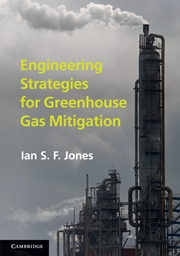Book contents
- Frontmatter
- Contents
- Preface
- Acknowledgments
- 1 The future greenhouse gas production
- 2 Changing energy efficiency
- 3 Zero-emission technologies
- 4 Geoengineering the climate
- 5 Ocean sequestration
- 6 Increasing land sinks
- 7 Adaptation
- 8 The past and the future
- Appendices
- Further reading
- References
- Index
- Plate section
6 - Increasing land sinks
Published online by Cambridge University Press: 07 September 2011
- Frontmatter
- Contents
- Preface
- Acknowledgments
- 1 The future greenhouse gas production
- 2 Changing energy efficiency
- 3 Zero-emission technologies
- 4 Geoengineering the climate
- 5 Ocean sequestration
- 6 Increasing land sinks
- 7 Adaptation
- 8 The past and the future
- Appendices
- Further reading
- References
- Index
- Plate section
Summary
The previous chapter discussed the 70% of the globe covered by the ocean, and in this chapter we consider the remaining 30% that is land. While the terrestrial ecosystem provides less than a tenth of the carbon storage of the ocean, it is about as active on a seasonal basis in terms of carbon flux in and out of the atmosphere. The upper 1m of soil contains some 2000GtC, while the present land vegetation stores about 750GtC, of which about 300GtC is stored above ground in forests. These are large stores of carbon which can be both enhanced as an alternative sink for atmospheric carbon or mobilised (unintentionally) to produce additional emissions. Most of the fossil fuel that is being burned to produce the rising atmospheric carbon dioxide came from the land. Remember that we estimated the recoverable fossil-fuel reservoir as 7000GtC. Logging of the forests for land clearance, and other changes in land use, add to the carbon dioxide emissions to the atmosphere at a rate of 2GtC per year. Vegetation grown for food is cycled once or twice a year and so does not hold much of the mobile carbon. In this chapter we will look at the three approaches to land storage of carbon.
The most direct approach is to pump compressed carbon dioxide into depleted oil and gas wells and this is already done for the purpose of recovering more oil. Aquifers can also be used.
- Type
- Chapter
- Information
- Engineering Strategies for Greenhouse Gas Mitigation , pp. 106 - 123Publisher: Cambridge University PressPrint publication year: 2011



